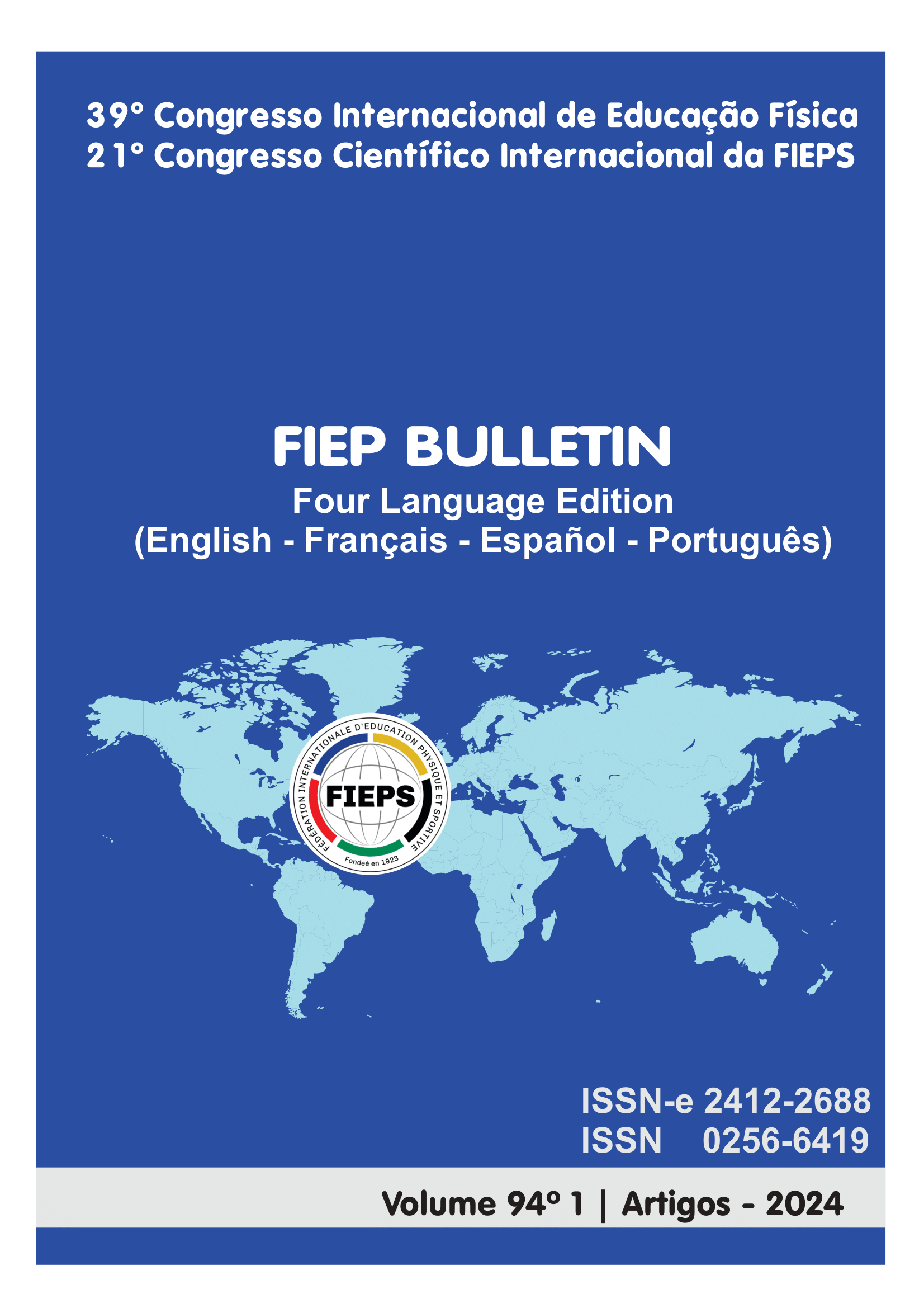CONSEQUÊNCIAS DA PANDEMIA DE COVID-19 NA COMPOSIÇÃO CORPORAL E SAÚDE MENTAL DE PROFESSORES DE EDUCAÇÃO FÍSICA DE JOÃO PESSOA
DOI:
https://doi.org/10.16887/fiepbulletin.v94i1.6734Abstract
Objective: To analyze the consequences of the Covid-19 pandemic on the body composition and mental health of physical education teachers in the city of João Pessoa. Methods: This is a cross-sectional descriptive study, in which a questionnaire was applied to 114 (48.3%) Physical Education teachers from the municipal network of João Pessoa. In this questionnaire there were questions about sociodemographic characteristics, body composition, physical and psychological health before and during the pandemic. For the quantitative data, the wilcoxon test was used, while for the qualitative data of the questionnaire, they were presented through descriptive statistics of frequency distribution. Results: It was observed that there was a higher relative frequency for men (56.1%), aged between 31 and 40 years old (40.4%), with 60.5% being married. As for physical and psychological health, there was a higher relative frequency of stress during the pandemic with an increase in the exhaustion phase (8.8%). As for health before and during the pandemic, there was the appearance of a classification that did not exist before the pandemic, which was the terrible classification (8.8%). In the comparative analysis of body mass and body mass index of all teachers, it was observed that there was a significant difference between before and during the pandemic (p=0.010; p=0.008), respectively. Teachers who did not have covid-19 significantly increased their body mass and body mass index (p=0.009, p=0.008), respectively. Conclusion: There was an increase in body composition and mental health of Physical Education teachers in the city of João Pessoa.
Downloads
References
ACSM. American College of Sports Medicine position stand. Quantity and quality of exercise for developing and maintaining cardiorespiratory, musculoskeletal, and neuromotor fitness in apparently healthy adults: guidance for prescribing exercise. Medicine and Science in Sports and Exercise, v. 43, n. 7, p. 1334-1359, 2011. DOI: https://doi.org/10.1249/MSS.0b013e318213fefb
ALVARENGA, R.; MARTINS, G. C.; DIPE, E. L.; CAMPOS, M. V. A.; PASSOS, R. P.; LIMA, B. N.; CAMARGO, L. B.; SÍLIO, L. F.; OLIVEIRA, J. R.; JUNIOR, G. B. V. Percepção da qualidade de vida de professores das redes públicas e privadas frente à pandemia do covid-19. Revista CPAQV – Centro de Pesquisas Avançadas em Qualidade de Vida, v. 12, n. 3, p. 2, 2020. DOI: https://doi.org/10.36692/cpaqv-v12n3-1
BARRETO, A. C. F.; ROCHA, D. S. COVID 19 e Educação: resistências, desafios e (im) possibilidades. Revista Encantar-Educação, Cultura e Sociedade, v. 2, p. 01-11, 2020. DOI: https://doi.org/10.46375/encantar.v2.0010
BRASIL. Ministério da Saúde. Coronavírus COVID – 19. Brasília, 2020. Disponível em: < https://coronavirus.saude.gov.br/.> acesso em 10 de Abril de 2021. >.
CAVA, E.; CARBONE, S. Coronavirus disease 2019 pandemic and alterations of body composition. Current Opinion in Clinical Nutrition and Metabolic Care, v. 24, n. 3, p. 229-235, 2021. DOI: https://doi.org/10.1097/MCO.0000000000000740
ESPINOZA-NAVARRO, O.; BRITO HERNÁNDEZ, L.; LAGOS-OLIVOS, C. Body composition and metabolic risk factors in primary in primary school teachers in Chile. International Journal of Morphology, v. 38, n. 1, p. 120-125, 2020. DOI: https://doi.org/10.4067/S0717-95022020000100120
GIUSTI, E. M.; PEDROLI, E.; D'ANIELLO, G. E.; STRAMBA B, C.; PIETRABISSA, G.; MANNA, C.; STRAMBA BADIALE, M.; RIVA, G.; CASTELNUOVO, G.; MOLINARI, E. The psychological impact of the COVID-19 outbreak on health professionals: a cross-sectional study. Frontiers in Psychology, v. 11, p. 1684, 2020. DOI: https://doi.org/10.3389/fpsyg.2020.01684
HODGSON, S. H.; MANSATTA, K.; MALLETT, G.; HARRIS, V.; EMARY, K. R. W.; POLLARD, A. J. What defines an efficacious COVID-19 vaccine? A review of the challenges assessing the clinical efficacy of vaccines against SARS-CoV-2. The Lancet Infectious Diseases, v. 21, n. 2, p. e26-e35, 2021. DOI: https://doi.org/10.1016/S1473-3099(20)30773-8
LIPP, M. E. N. Manual do inventário de sintomas de stress para adultos de Lipp (ISSL). São Paulo:Casa do Psicólogo, 2000.
NIH. National Institutes of Health. Coronavirus disease 2019 (COVID-19) treatment guidelines. 2020.
OPAS. Organização Pan-Americana da Saúde. Folha informativa COVID-19 - Escritório da OPAS e da OMS no Brasil. . 2020. Disponível em: < <https://www.paho.org/pt/covid19>. acesso em 10 de Abril de 2021. >.
SCHEUCH, K.; HAUFE, E.; SEIBT, R. Teachers’ health. Deutsches Ärzteblatt International, v. 112, n. 20, p. 347-356, 2015. DOI: https://doi.org/10.3238/arztebl.2015.0347
SELYE, H. Stress a tensão da vida. 2ª. São Paulo:Ibrasa, 1965.
STACHTEAS, P.; STACHTEAS, C. The psychological impact of the COVID-19 pandemic on secondary school teachers. Psychiatriki, v. 31, n. 4, p. 293-301, 2020. DOI: https://doi.org/10.22365/jpsych.2020.314.293
Downloads
Published
Issue
Section
License
Autores que publicam nesta revista concordam com os seguintes termos:- Autores mantém os direitos autorais e concedem à revista o direito de primeira publicação, com o trabalho simultaneamente licenciado sob a Licença Creative Commons Attribution que permite o compartilhamento do trabalho com reconhecimento da autoria e publicação inicial nesta revista.
- Autores têm autorização para assumir contratos adicionais separadamente, para distribuição não-exclusiva da versão do trabalho publicada nesta revista (ex.: publicar em repositório institucional ou como capítulo de livro), com reconhecimento de autoria e publicação inicial nesta revista.
- Autores têm permissão e são estimulados a publicar e distribuir seu trabalho online (ex.: em repositórios institucionais ou na sua página pessoal) a qualquer ponto antes ou durante o processo editorial, já que isso pode gerar alterações produtivas, bem como aumentar o impacto e a citação do trabalho publicado (Veja O Efeito do Acesso Livre).










